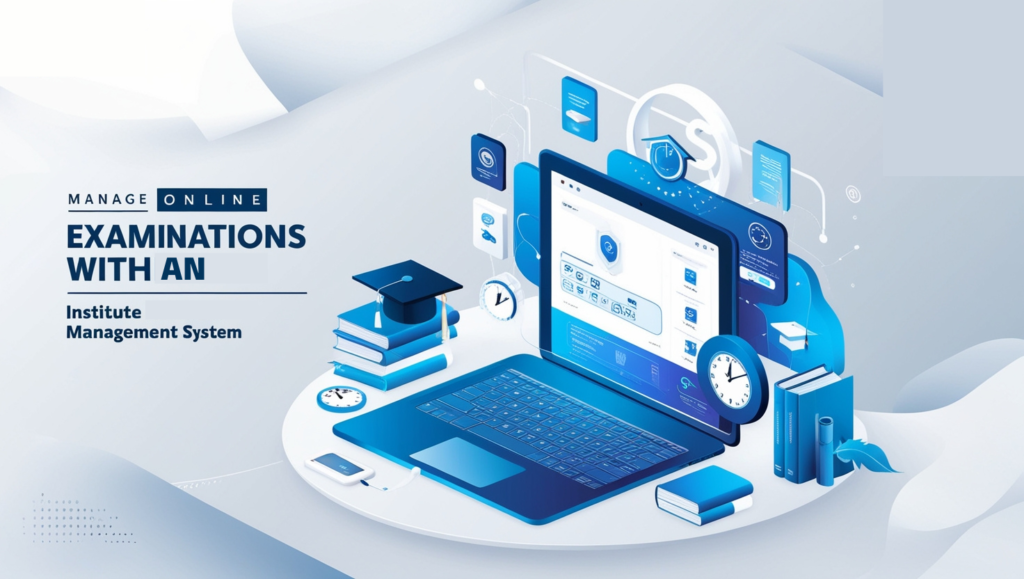Managing Online Examinations with an Institute Management System

The growing demand for flexible and digital learning environments has led many educational institutions to adopt online examinations as a key component of their assessment processes. Managing online exams, however, comes with its own set of challenges, from scheduling and proctoring to tracking student performance and ensuring security. An Institute Management System (IMS) offers a comprehensive solution to these challenges by automating and streamlining the entire online examination process. In this article, we will explore how an IMS can simplify digital exam management and improve the overall efficiency of the assessment process.
The Role of IMS in Online Exam Management
An Institute Management System (IMS) is designed to manage multiple aspects of an institution’s operations, including academic and administrative tasks. When it comes to online exams, IMS provides a robust platform that supports everything from exam scheduling to automated grading, making the examination process more efficient for both administrators and students.
IMS platforms like Digital Class offer integrated exam management features that allow institutions to administer online tests, track exam progress in real time, and generate detailed reports on student performance—all within a single system. By leveraging such tools, institutions can reduce the administrative burden associated with exams and ensure that students have a seamless experience.
Key Benefits of Managing Online Examinations with IMS
1. Automated Exam Scheduling and Setup
One of the most time-consuming aspects of managing exams is scheduling and setting up the exam environment. An IMS automates the scheduling process by allowing administrators to set exam dates, times, and formats (multiple-choice, essay, etc.) with just a few clicks. The system can also allocate students to specific virtual examination rooms and ensure that the appropriate time slots are reserved for each group.
By automating these processes, IMS minimizes scheduling conflicts and ensures that exams are conducted efficiently without manual intervention. The system also provides students with automated notifications about exam schedules and updates, keeping them informed every step of the way.
2. Digital Exam Management for Seamless Conduct
Managing online examinations manually can lead to errors, miscommunication, and a lack of transparency. An IMS eliminates these issues by digitizing every aspect of the exam process, from setting questions to assigning proctors. Once the exams are set up, students can log in through the IMS portal and access their exams at the designated time.
The system also supports different exam formats, including multiple-choice, short answer, and essay questions, ensuring that exams cater to diverse assessment needs. Additionally, IMS solutions provide tools for randomizing questions to prevent cheating, setting time limits, and ensuring that exams are automatically submitted upon completion.
Digital Class IMS, for example, provides seamless integration of digital tools for managing exams, allowing administrators to monitor exams in real time while ensuring that students adhere to the rules and protocols of online assessments.
3. Real-Time Monitoring and Online Proctoring
One of the challenges of conducting online exams is ensuring academic integrity. An IMS addresses this by offering real-time monitoring and online proctoring features. These features allow invigilators to monitor students through live video feeds, track their activities during the exam, and detect any suspicious behavior that may indicate cheating.
Some IMS platforms also offer AI-based proctoring, where the system automatically flags unusual behavior, such as multiple logins or the use of unauthorized resources, for further review. This ensures that exams are conducted fairly and transparently, regardless of the students’ location.
4. Automated Grading and Result Generation
Grading exams manually can be a time-consuming and error-prone task, especially when dealing with large volumes of students. An IMS simplifies the grading process by automating the evaluation of multiple-choice and objective-type questions. The system instantly calculates scores and generates detailed reports on student performance.
Even for subjective exams, where manual grading may be required, IMS allows instructors to review and score exams directly within the system, making the process faster and more organized. Once the grading is complete, students can view their results through the IMS portal, eliminating the need for manual result distribution.
5. Detailed Analytics and Reporting
An IMS offers powerful analytics tools that provide insights into the exam process and student performance. Administrators and faculty can generate detailed reports on exam participation, average scores, pass/fail rates, and other key metrics. These insights help institutions evaluate the effectiveness of their assessments and make data-driven decisions about curriculum adjustments or student support.
For example, with Digital Class IMS, institutions can track student performance across various exams and identify trends, such as which topics students are struggling with. This data can be used to improve teaching strategies and provide additional resources to students in need.
6. Enhanced Student Experience
From a student’s perspective, the ease of managing online exams through an IMS significantly enhances their overall experience. Students can access all exam-related information—such as schedules, instructions, and results—in one place, reducing confusion and anxiety. Moreover, automated reminders and notifications keep students on track and prepared for their assessments.
The user-friendly interface of systems like Digital Class IMS ensures that students can navigate the platform with ease, allowing them to focus on their exams without technical difficulties. By offering a smooth, efficient process, IMS boosts student satisfaction and helps institutions maintain a positive academic reputation.
Conclusion
Managing online examinations with an Institute Management System is a game-changer for educational institutions, offering a more efficient, secure, and transparent process. From automated scheduling and proctoring to real-time monitoring and grading, IMS platforms streamline the exam process and ensure that students and faculty alike benefit from a seamless experience.
Systems like Digital Class IMS exemplify how institutions can harness digital tools to conduct exams smoothly, monitor student progress in real time, and generate valuable insights through detailed analytics. By integrating these solutions, educational institutions can stay ahead in the digital age and provide students with an optimized, technology-driven examination process.
